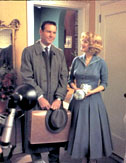
Movie Guru Rating:

Comment
on this review
| |

Todd Haynes' Far From Heaven richly pits perception against reality
by Adrienne Martini
In an effort to be kind and generous this holiday season, I shall call the following quirk of generations older than mine a "trick of age" rather than an irritating, unobservant utterance often foisted on those who grew up after 1965. All the years leading up to this date were not "the good old days." These halcyon eras only seem to have been divine perfection. Memory is always selective, at best, and doubly so should you have had the great fortune to have been born white, male and heterosexual.
In terms of sheer numbers, Caucasian straight boys have always been outnumbered in this country. Yet, until fairly recently, it is their version of events that hit the big and little screens and printed page. History is always recast by the victors, which is why—again, until fairly recently—the past was generally cast with a warm, sepia-toned glow and spoken about in fond terms. Ah, the Good Old Days: When men were men and everyone else knew his or her place.
Which is one of the many reasons why director Todd Haynes' Far From Heaven is so very refreshing, dealing as it does with the consequences of not fitting the constraints of the society you happen to be living in. On its surface, Heaven is a subversive tribute to Douglas Sirk's 1950s cinematic morality tales, in which good girls were rewarded with a perfect breadwinner, polite offspring, and a presentable house. Haynes' Heaven goes one step further, of course, by tossing just one, tiny change into this shiny, happy Sirk world: what would happen if your perfect breadwinner was more into the amorous affections of those of his own sex rather than those of its opposite?
Apparently, the idea that homosexuality has always been part of the human condition comes as a great surprise to some—including one woman at Saturday's screening of Heaven who loudly announced, just after two men kissed, that she would not watch such trash. While Haynes can't help but be influenced by the time in which he came of age, during which one's sexual orientation became a bit more open and accepted (even here in East Tennessee), it's remarkably hard to believe that same-sex love wasn't just as prevalent 50 years ago. The difference being, of course, that in the good old '50s, deviants were either dealt with harshly by being forced onto the outskirts of mainstream society or forced to keep their differentness a dirty secret and live lives of unrelenting misery. The stories of these unfortunates was believed to be unworthy of being told. In other words, trash.
The first third of Heaven basks in Sirkian fantasy. Wife Cathy's (Julianne Moore) daily existence is bliss. Her kids—one boy and one girl, naturally—call their parents "mother" and "father," do their homework religiously and participate in gender-appropriate activities. Cathy's black housekeeper speaks only when spoken to. Cathy's hardworking husband stays late at the office, earning more scratch to maintain their lovely suburban home. Cathy has it all, until that one fateful day when she delivers dinner to her hubby at the office, where she finds him tete-a-tete with a dark-haired stranger.
After this first, deepest cut, Heaven veers from the Sirk formula and finds its own, modern velocity. While Cathy steadfastly stands by her man as he tries to straighten out, she also starts to realize that their relationship isn't all it could be. She can finally admit that her fulfillment may lie elsewhere—and cross an even bigger taboo. Moore's performance is nothing short of amazing. Her Cathy is equal parts über-confident homemaker and wife, intelligent and independent woman, and vulnerable girl in love. Never once does her characterization dip into cloying stereotype; she is a complete and complex character.
The same can be said for all of the leads, really. Dennis Quaid as Cathy's wayward husband Frank has a poignant humanity, dealing with a difficult situation as best he can with the meager tools he's been given. The family's black gardener, played by Dennis Haysbert, has surprising depth that resists easy description. Even Cathy's best pal Patricia Clarkson has more than two dimensions. Granted, Cathy's two kids are nothing more than ciphers, but in Haynes' defense, he did have a lot of other ground to cover.
Judged simply by the appearance of Heaven, you'd never know the pain in its core. Even at its most emotionally turbulent, the film still looks beautiful, with each carefully chosen object in its place and each hairstyle and costume still carefully composed. More than sexuality or race, this is what Heaven is truly about. Surface gloss can cover depthless pools of quiet desperation—yet all that gets remembered most of the time is the gloss itself.

November 28, 2002 * Vol. 12, No. 48
© 2000 Metro Pulse
|